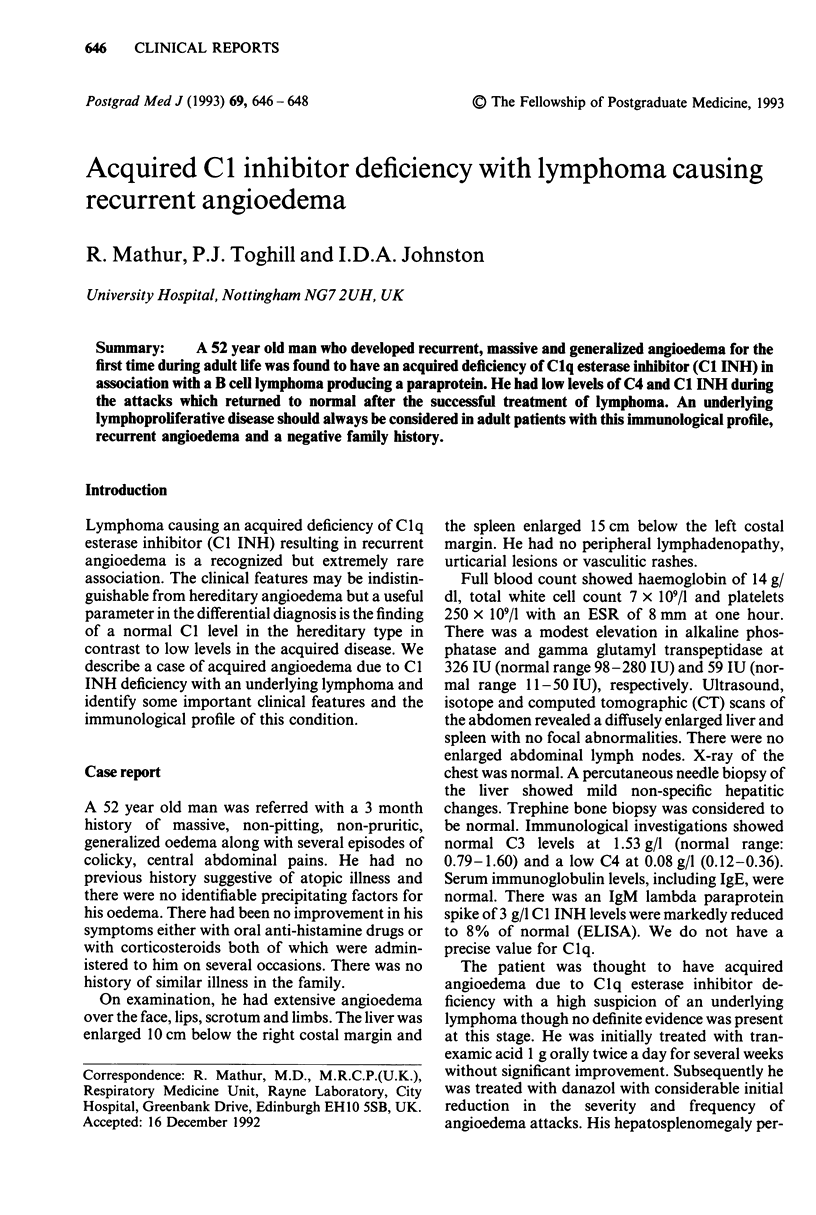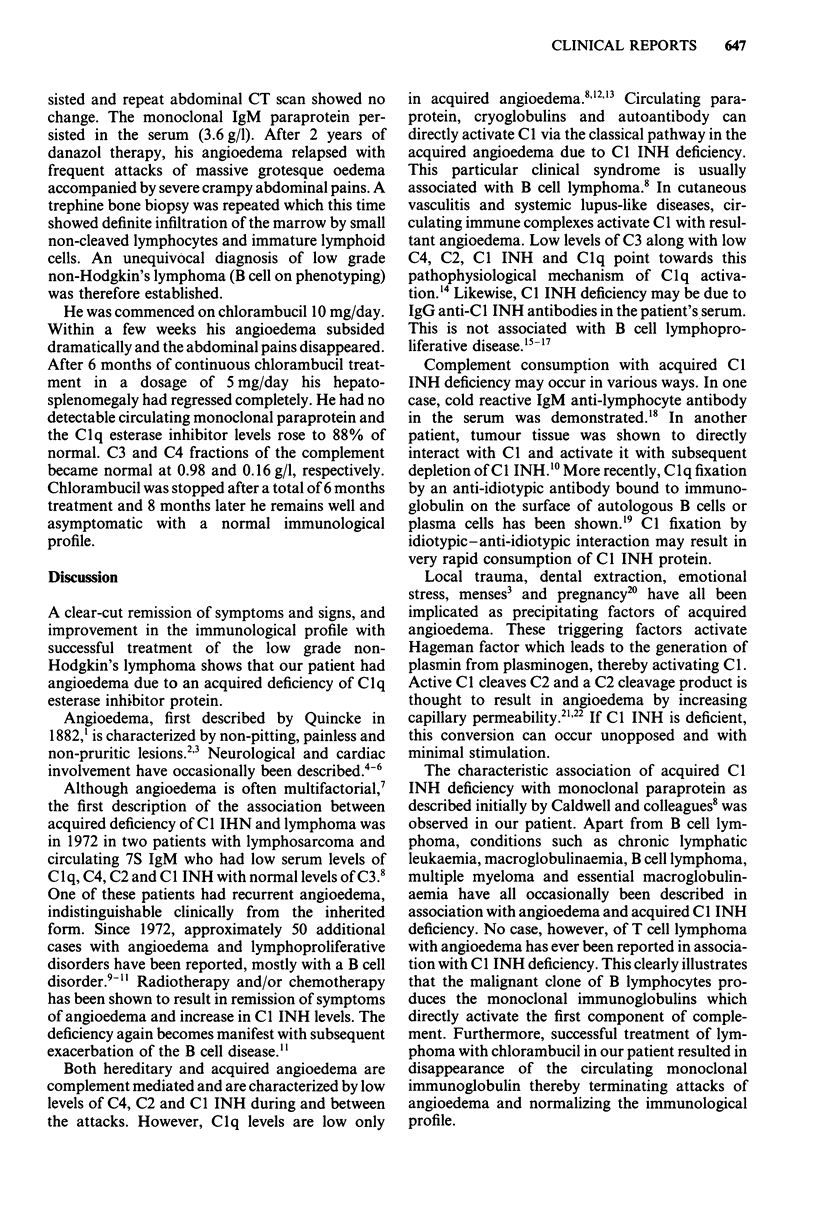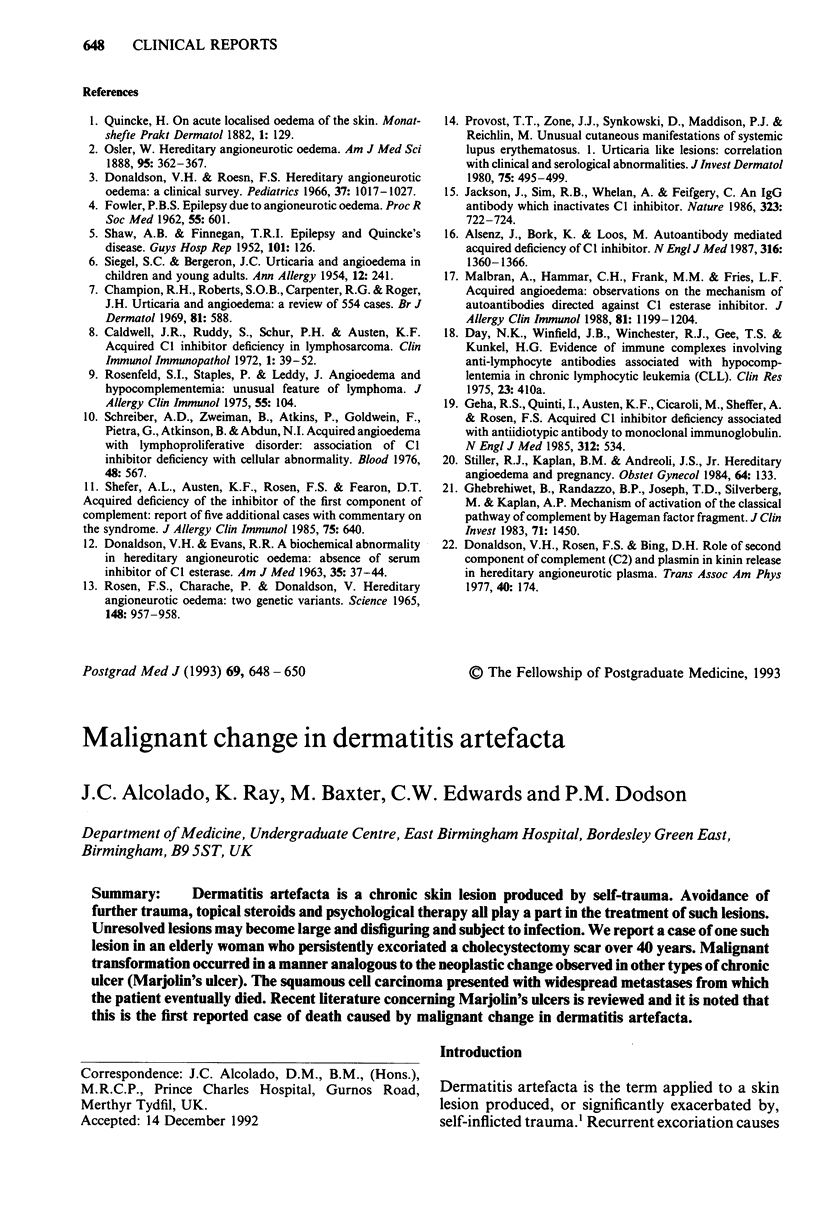Abstract
A 52 year old man who developed recurrent, massive and generalized angioedema for the first time during adult life was found to have an acquired deficiency of C1q esterase inhibitor (C1 INH) in association with a B cell lymphoma producing a paraprotein. He had low levels of C4 and C1 INH during the attacks which returned to normal after the successful treatment of lymphoma. An underlying lymphoproliferative disease should always be considered in adult patients with this immunological profile, recurrent angioedema and a negative family history.
Full text
PDF


Selected References
These references are in PubMed. This may not be the complete list of references from this article.
- Alsenz J., Bork K., Loos M. Autoantibody-mediated acquired deficiency of C1 inhibitor. N Engl J Med. 1987 May 28;316(22):1360–1366. doi: 10.1056/NEJM198705283162202. [DOI] [PubMed] [Google Scholar]
- Champion R. H., Roberts S. O., Carpenter R. G., Roger J. H. Urticaria and angio-oedema. A review of 554 patients. Br J Dermatol. 1969 Aug;81(8):588–597. doi: 10.1111/j.1365-2133.1969.tb16041.x. [DOI] [PubMed] [Google Scholar]
- DONALDSON V. H., EVANS R. R. A BIOCHEMICAL ABNORMALITY IN HEREDIATRY ANGIONEUROTIC EDEMA: ABSENCE OF SERUM INHIBITOR OF C' 1-ESTERASE. Am J Med. 1963 Jul;35:37–44. doi: 10.1016/0002-9343(63)90162-1. [DOI] [PubMed] [Google Scholar]
- Donaldson V. H., Rosen F. S., Bing D. H. Role of the second component of complement (C2) and plasmin in kinin release in hereditary angioneurotic edema (H.A.N.E.) plasma. Trans Assoc Am Physicians. 1977;90:174–183. [PubMed] [Google Scholar]
- Donaldson V. H., Rosen F. S. Hereditary angioneurotic edema: a clinical survey. Pediatrics. 1966 Jun;37(6):1017–1027. [PubMed] [Google Scholar]
- Geha R. S., Quinti I., Austen K. F., Cicardi M., Sheffer A., Rosen F. S. Acquired C1-inhibitor deficiency associated with antiidiotypic antibody to monoclonal immunoglobulins. N Engl J Med. 1985 Feb 28;312(9):534–540. doi: 10.1056/NEJM198502283120902. [DOI] [PubMed] [Google Scholar]
- Ghebrehiwet B., Randazzo B. P., Dunn J. T., Silverberg M., Kaplan A. P. Mechanisms of activation of the classical pathway of complement by Hageman factor fragment. J Clin Invest. 1983 May;71(5):1450–1456. doi: 10.1172/JCI110898. [DOI] [PMC free article] [PubMed] [Google Scholar]
- Jackson J., Sim R. B., Whelan A., Feighery C. An IgG autoantibody which inactivates C1-inhibitor. Nature. 1986 Oct 23;323(6090):722–724. doi: 10.1038/323722a0. [DOI] [PubMed] [Google Scholar]
- Malbran A., Hammer C. H., Frank M. M., Fries L. F. Acquired angioedema: observations on the mechanism of action of autoantibodies directed against C1 esterase inhibitor. J Allergy Clin Immunol. 1988 Jun;81(6):1199–1204. doi: 10.1016/0091-6749(88)90891-3. [DOI] [PubMed] [Google Scholar]
- Provost T. T., Zone J. J., Synkowski D., Maddison P. J., Reichlin M. Unusual cutaneous manifestations of systemic lupus erythematosus: I. Urticaria-like lesions. Correlation with clinical and serological abnormalities. J Invest Dermatol. 1980 Dec;75(6):495–499. doi: 10.1111/1523-1747.ep12524310. [DOI] [PubMed] [Google Scholar]
- ROSEN F. S., PENSKY J., DONALDSON V., CHARACHE P. HEREDITARY ANGIONEUROTIC EDEMA: TWO GENETIC VARIANTS. Science. 1965 May 14;148(3672):957–958. doi: 10.1126/science.148.3672.957. [DOI] [PubMed] [Google Scholar]
- SHAW A. B., FINNEGAN T. R. L. Epilepsy and Quincke's disease. Guys Hosp Rep. 1952;101(2):126–129. [PubMed] [Google Scholar]
- SIEGEL S. C., BERGERON J. G. Urticaria and angioedema in children and young adults; etiologic and electrocardiographic findings in one hundred fifteen cases. Ann Allergy. 1954 May-Jun;12(3):241–252. [PubMed] [Google Scholar]
- Schreiber A. D., Zweiman B., Atkins P., Goldwein F., Pietra G., Atkinson B., Abdou N. I. Acquired angioedema with lymphoproliferative disorder: association of C1 inhibitor deficiency with cellular abnormality. Blood. 1976 Oct;48(4):567–580. [PubMed] [Google Scholar]
- Sheffer A. L., Austen K. F., Rosen F. S., Fearon D. T. Acquired deficiency of the inhibitor of the first component of complement: report of five additional cases with commentary on the syndrome. J Allergy Clin Immunol. 1985 Jun;75(6):640–646. doi: 10.1016/0091-6749(85)90087-9. [DOI] [PubMed] [Google Scholar]
- Stiller R. J., Kaplan B. M., Andreoli J. W., Jr Hereditary angioedema and pregnancy. Obstet Gynecol. 1984 Jul;64(1):133–135. [PubMed] [Google Scholar]


